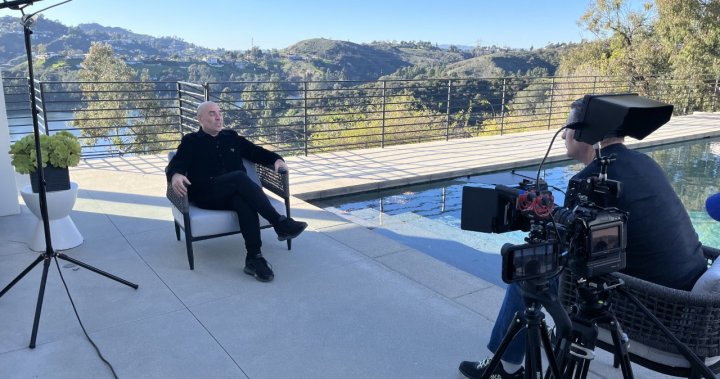HOLLYWOOD—Merck Mercuriadis is pretty relaxed for a guy who just made the biggest deal of his career. Twenty-four hours after acquiring Justin Bieber’s song catalogue for a rumoured US$200 million — his most expensive deal to date — his biggest concern is moving house.
“Business is under control,” he says with a quiet smile. “It’s the move that’s stressing me out.” Top of the list? Wondering how is 100,000 vinyl albums will make the trip.
Sitting poolside at an almost empty house below the Hollywood sign — the movers are about to arrive to take the remaining furniture to a new place in Laurel Canyon — Merck has delayed leaving until we’ve had a chance to talk.
Read more:
Justin Bieber sells entire music back catalogue to Hipgnosis
Read next:
Former Mississauga mayor Hazel McCallion dies at 101
Merck, in case you don’t know, is the Quebec-born former rep for Virgin Records who went on to manage Guns N’ Roses, Elton John, and Morrissey, among others. Today he heads up the Hipgnosis Song Fund, one of about a dozen heavy-hitting companies buying up the rights to songs by the biggest artists in the world. He (and a few others like him) believe that these songs are eternal, an essential part of our culture, and will be enjoyed by people for decades to come. That means this music will generate income — a lot of it.
Hipgnosis has spent US$3 billion over the last 10 years and now manages somewhere in the neighbourhood of 60,000 songs. That includes compositions by Neil Young, David Crosby, Barry Manilow, Eurythmics, Blondie, The Pretenders, Shakira, Shawn Mendes, Leonard Cohen, Red Hot Chili Peppers, Fleetwood Mac, Kenny Chesney, Justin Timberlake, and dozens and dozens of others.
The company is named after the iconic album artwork studio headed by Storm Thorgerson, responsible for dozens of unforgettable covers, including many commissions for Pink Floyd. Storm, a longtime friend, is also responsible for Merck’s Hipgnosis logo which features an upside-down elephant.
“I asked him, ‘What does that have to do with what I’m trying to do?’” Merck says. “He replied, ‘That’s not an upside-down elephant. That’s an elephant that’s blown away by how good the music is.’ A few years ago, Billboard said ‘Someone’s just explained to us what the logo means. You’re turning the music industry upside down.’ And I said, ‘OK. Sure.’”
Merck sees songs as excellent long-term investments. “What I wanted to do was establish songs as an asset class for institutional investors and the stock market,” he told me. “I want them to understand that when these songs become successful, they become part of the fabric of people’s lives and our society. Therefore, they have very reliable and very predictable incomes — and that makes them investable.
“Songs are even better than gold or oil because if you’re living your best life, you’re doing it to a soundtrack of great music. And you’re also listing to music if you’re being challenged, whether it’s through a pandemic, inflation, a recession, high-interest rates, or whatever it might be. You’re taking comfort and escaping with great music. So great music is always being consumed.”
Merck is very bullish on streaming. “The old benchmark for extraordinary success was a platinum album, which in the U.S. is sales of one million copies [and 80,000 in Canada] in a country that has 330 million people. That means one in every 330 people bought that album. That immediately tells you that the average person might have loved music but didn’t love it enough to put their hand in their pocket and pay for it. Today, that one in 330 million people has been replaced by 100 million homes that have a paid-for streaming subscription. That means we’ve gone from one in 330 to one in 3.6.”
He believes that companies like Hipgnosis are essential to the future health of music. “The big record companies are managing 20,000 songs and creating new songs every day. They don’t have the bandwidth to work the incredible hits in their catalogues. We’ve replaced that with song management.
“My job has always been to be an artist manager. I can’t play the guitar. I can’t sing a song. What I bring to the table is responsibility. Now I’m putting the same responsibility into managing great songs like Sweet Dreams are Made of This.”
Read more:
Which artists will be next to sell their song catalogues? (Jan. 9, 2022)
Read next:
France’s plan to raise pension age ‘no longer negotiable’, prime minister says
His goal is to ultimately make songwriters better paid and to give them an opportunity to put song revenue to work for them.
“If you’re Justin Bieber, you haven’t made this deal to take the money and spend it. You’ve taken the deal so you can put this money to work for you and make more money than you otherwise would have.”
There are also solid tax reasons for selling your music to a company like Hipgnosis. If you take royalty cheques on a regular basis, most governments look at that as salary income, which can be taxed at a rate as high as 50 per cent. If the artist takes future royalties up front in a lump sum, that’s considered capital gains and the tax rate drops to about 20 per cent. If you’re talking about a deal with tens of millions or even hundreds of millions of dollars, that’s a big difference.
The artist also benefits by being able to engage in efficient estate planning. The money can be invested, and used for philanthropy or activism. And depending on the deal, the artist may still retain a royalty stream from future compositions as only the proven, successful songs are included in the buyout.
So how does an entity like Hipgnosis determine what an artist’s catalogue is worth? “Sometimes people look it [valuations] as a multiple of annual earnings. We look at it from the point of view of what’s the return on investment. How are your songs performing in a streaming world relative to the rest of the market? If you have 70 million monthly listeners on Spotify, your catalogue is going to be worth a lot more than if you have 10 million monthly listeners.
“We have an incredibly diverse catalogue. Having established songs as an asset class, there are some things to consider. Copyright protection for songs in North America has been extended to 70 years after the death of the last co-composer. We’ve paid an average of 15x multiples for songs and we have an income stream that’s going to last for 101 years.
“If you’re a major Bruce Springsteen fan, you’re probably at least 50 years old— that’s around the average age of his fanbase. But if you’re a Justin Bieber fan, you have maybe 60 or 70 years in front of you as opposed to 30 years for that Springsteen fan. If you’re a good parent, you’ll teach your kids about Springsteen, but … life. And Springsteen has about 17 million monthly followers on Spotify versus Justin Bieber’s 80 million.”
Read more:
Alan Cross explains why companies are buying up the rights to thousands of songs
Read next:
Snowfall warnings issued for parts of southern Ontario as more wintery weather moves in
Merck is always looking at deals. He approaches people and people approach him, always with an eye on how songs can be best exploited for revenue. That includes old-school things like sales, radio airplay, and other pubic performance income, but goes far beyond that. Streaming, obviously. Placement in TV shows. Appearances in movies. Licensing for commercials. Encouraging other artists to cover the songs. And here’s a big one: licensing samples for use in new compositions.
“Interpolations [the incorporation of elements of old song into a new track] is a big one,” Merck says.
“We had a number one record last year with Nikki Minaj’s Super Freaky Girl, which is an interpolation of Rick James’ Super Freak, which was obviously also interpolated into MC Hammer’s Can’t Touch This. We got a piece of all that. And in 20 years’ time, it’ll be interpolated again and be a number-one record for someone else. And along the way, it’ll be used in 20 different samples, in movies and TV commercials, and video games. And most importantly for me, we will celebrate Rick James in a way he hasn’t been able to be celebrated because we’ve got the bandwidth to be able to do it.
“And Rick James is more than just Super Freak. If you go back and listen to Prince, you will see how important Rick was to him. He was a serious player, a serious songwriter, a serious arranger, a serious producer. Rick was the real deal and we, as the custodians of that catalogue, a real responsibility to make sure that Rick James is celebrated as one of the great artists of all time.”
Read more:
How did the Canadian music industry do in 2022? The year-end stats are out
Read next:
Can AI be used to help people with disabilities? Experts say yes, with the ‘right data set’
Will this emphasis on older songs over the coming decades have a deleterious effect on new artists? If the companies like Hipgnosis push to keep this music alive beyond what would have been their best-before date in the old world, will it drown out new music?
“One of the things that come along with streaming,” says Merck, “is widespread adoption. Today there are over 600 million people who stream music, up from 30 million just a few years ago. In a decade, we could have as many as two billion people streaming music. What that does is give the music industry a level of data that it’s never had before.
“People are printing these articles saying that 70 per cent of the world is listening to catalogue [songs more than 18 months old] and only 30 per cent are listening to new music, ergo which must mean new music is dying. That’s BS. The bottom line is that 70-30 split has always been there. You just didn’t have the data.
“When I was growing up, for every new record I bought, I was listening to older records, too. For every new Yes record I bought, I would buy an old Doors, Beatles, or Jimi Hendrix record. We’re still doing the equivalent today.”
With the sun setting and the movers about to arrive to remove the last of the pool furniture, it’s time to go. We wander into the backyard for a last look over the Hollywood Reservoir.
“See that house over there?” Merck points to a Spanish-style place hanging over the mountain. “Madonna’s old place. And there — “he points to another house across the way — “Moby used to live there.” And straight ahead, probably the best view of the Hollywood sign from any private residence in LA. The new place in Laurel Canyon beckons.
I hope all those records make it safely.
—
Alan Cross is a broadcaster with Q107 and 102.1 the Edge and a commentator for Global News.
Subscribe to Alan’s Ongoing History of New Music Podcast now on Apple Podcast or Google Play



